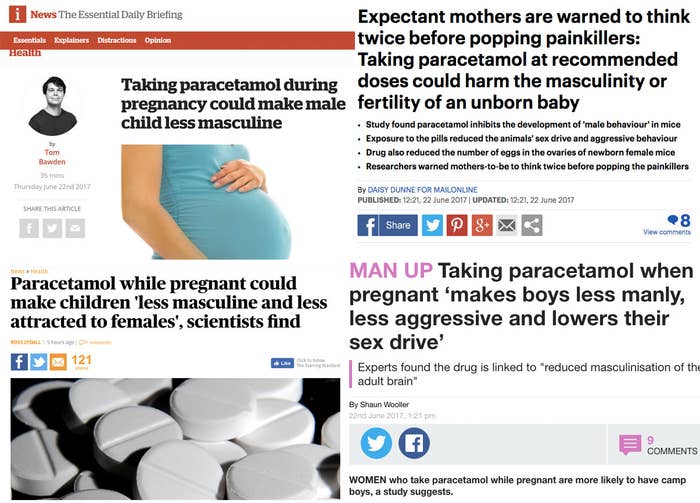Several British newspapers ran a story Thursday claiming taking paracetamol during pregnancy could make your child "less manly".

The Evening Standard was the first; later, the Sun, the Daily Mail, and The i all followed. The Sun's headline said "taking paracetamol when pregnant ‘makes boys less manly, less aggressive and lowers their sex drive’"; the Standard's was "paracetamol while pregnant could make children 'less masculine and less attracted to females', scientists find". And the Mail reported "expectant mothers are warned to think twice before popping painkillers".
Most terrifyingly of all, the Standard warned that paracetamol could make males "less attracted to females". An apocalyptic scenario, you'll no doubt agree.
On social media, many people said the papers seemed to be claiming that paracetamol makes you gay.
Paracetamol turned me gay... or something... *le sigh* https://t.co/fZJBfXykzy
TL;dr: Calpol makes you gay* *This is almost certainly not true.
You'd think, from reading that, that there had been a study that showed that taking paracetamol in pregnancy could make your child less manly.
Because that's what they all say, isn't it? They say "your child", "babies", "boys", "male children".
But you'd be wrong. There's been a study that suggested that BABY MICE are less likely to display masculine traits if their mother is exposed to paracetamol during pregnancy.

So unless you're a mouse, or pregnant by a mouse – mazel tov, by the way! – the study is immediately of less relevance to your decision-making process.
Of course, mouse studies are useful guides to future research in humans, so maybe this can tell us something, right? Well, no, not really.
And I'll tell you for why!
For one thing, the dose that the affected mice were given was pretty huge – weight for weight, about three times the dose you'd take.

The mice who showed effects had been given a dose of 150 milligrams of paracetamol per kilogram of body weight per day. (So a mouse weighing 20 grams would be given 3 milligrams of paracetamol a day.)
By comparison, the recommended dose in humans for oral paracetamol is a maximum of 4g a day. That is eight standard paracetamol tablets. For a 70kg person (the average weight of a British woman) that's about 57 milligrams per kilogram of body weight. And that's the maximum. Often, you'll have half or a quarter of that.
The study also looked at the effects of 50 milligrams per kilogram per day on mice. They didn't find any.
And for another thing, the mice were exposed to paracetamol for two-thirds of the whole duration of their pregnancy.
That's the equivalent of taking a triple dose of paracetamol every day for six months, the entire second and third trimester. It's just not how most people would realistically take paracetamol.
If you are taking 24 paracetamol pills every day then it probably is a good idea to stop, whether you're pregnant or not.
This doesn't necessarily mean the study was a bad study. But it can't tell us much about the impacts of paracetamol on real human babies in real human wombs.
The Science Media Centre, an organisation that works to help journalists report science accurately, got quotes from four experts who all said it was a good study as far as it went but that its results weren't really applicable to humans.
The British Pregnancy Advisory Service, by contrast, told BuzzFeed News that the study was "absurd" and said, "We feel strongly it’s time to call time on these daft experiments which invariably conclude with calls to further restrict women’s already limited choices while pregnant."
They added: "If pregnant women have a headache after reading such nonsense, they should definitely feel free to take a paracetamol or two."
And for all the talk of pregnant women being "warned to think twice" about paracetamol, in fact the NHS advice remains exactly the same as it was yesterday.
That advice is to take paracetamol if you're in mild to moderate pain or have a high temperature, but "as with any medicine taken during pregnancy, use paracetamol at the lowest effective dose for the shortest possible time".
"There is no clear evidence that it has any harmful effects on an unborn baby," it said. The NHS Choices site said much the same.
